Until a couple weeks ago I hadn’t bought any art or photo books this year. In today’s online age something really has to speak to me for me to want to make space for it at home in tangible, doorstop form. Chris McCaw’s new–and first–book, Sunburn, was the release that broke this year’s bookless streak.

Sunburn / Chris McCaw.
Richmond, VA: Candela, 2012.
Dimensions: 10 1/2 x 11 1/2 in.
96 pages, 43 plates
ISBN 978-0-9845739-2-9
From cover to cover this is a book of photographs incorporating one main subject: the sun. But this is the sun photographed in a way that’s never been done before.
Chris uses giant lenses, many of them weighing dozens of pounds, and aims them at a sheet of vintage photo paper inside big cameras of his own making. All that light generates a lot of heat, and the paper inside the camera often scorches the areas where the sun’s image falls on it. Most of the exposures are many minutes to many hours long, so that as the sun moves through the sky it burns lines and arcs onto the paper in the camera. Sometimes little fires break. Photo paper isn’t used to all this light, and in addition to flaming out every now and then it can do some wacky things with a process called solarization, where some parts of the image are flipped from negative to positive. In a few of the images you can also see some rich colors others than black or white or gray in the danger zone around the sun’s image, a reaction of the paper’s chemistry to being used in ways it wasn’t designed to be used. (The book’s cover image above demonstrates this nicely.)
The method of working would remain an interesting anecdote if it didn’t result in some pretty startling photographs. Be sure to click and enlarge these images to begin to see all their beautiful little subtleties. You’ll be glad you did.
Chris McCaw. Sunburned GSP#65 (Nevada), 2007. 16″x20″ unique gelatin silver paper negative. Private collection.
This early piece shows the classic burn-through with the sun’s path.
Chris McCaw. Sunburned GSP#190, 2008. 20″x24″ unique gelatin silver paper negative. Fidelity Investments Collection.
In this and the next image the sun didn’t scorch through the paper, but it did some cool things with the branches in the foreground.
Chris McCaw. Sunburned GSP#325, 2009. 4″x5″ unique gelatin silver paper negative. Private collection.
Some photography concerns itself with the world outside the camera. It’s photography about people, places, issues and ideas. Other kinds of photography do a lot of navel-gazing obsessing about the process of photography itself. This second camp expresses itself in lots of different ways, including images produced using antique photographic processes, toy cameras, camera-less photograms, or images created by the chemical reaction of the entrails of bunnies with color photographic paper. (No, I’m not making this up. The photographer Adam Fuss has a body of work that apparently ended up with his family and friends eating many meals that featured rabbit as the main course.) I think Chris’s work falls a little more on the camera-geek side of the equation, and his work is instantly appealing to photographers familiar with the materials he works with. But the resulting photos of landscape with a sun’s path burned out of the sky, with mysterious flips of positive and negative, dark and light, are pretty wonderful things that viewers attuned to beautiful objects will immediately connect with.
Chris McCaw. Sunburned GSP#541(Galápagos), 2012. 8″x10″ unique gelatin silver paper negative.
The sun’s path changes with the seasons and with your location on the earth. If you want to have your sun rise up the center of the photo in a perfectly straight line you have to do some traveling to the earth’s equator, which is exactly what Chris did, taking this photo off the coast of the Galápagos Islands earlier this year. Wow, huh? The sun’s reflection really makes this image.
And there’s a sort of companion piece to this one, a big multi-panel panorama he shot up in Alaska’s Brooks Range, where the sun never sets as it marks a long, slow parabola over the mountains on the horizon over the course of more than a day. Double wow. (It’s on pages 68-69 of his book.)
And did I mention Chris is a really cool guy? A few years back I was on a little desert camping trip to Anza Borrego with four other photographers, and Chris was one of them. At that point he’d figured out that there was something really interesting when you burn a photographic negative, but hadn’t yet worked out his current method that uses big sheets of photographic paper that serve as the final artwork, scorch marks and all. To think, I knew the Chris way back when before impending greatness.
So…if you have a big, rectangular stocking to fill later this month, this might be the perfect thing to put in it!
Oh, and I forgot to mention this impressive frontispiece to the book. The image is Sunburned GSP#573(eclipse), 2012. Cool enough, but the page has been die-cut to give you a sense of how it would be to handle one of these photos. I didn’t shoot the back of the page, but there you’ll find reproduced the backside of the image with scorch marks and Chris’s notations. It’s for things like this that the word-elves invented the word “awesome.”
All images in this post are copyright the artist, and are used here with his permission.

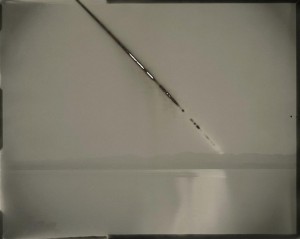
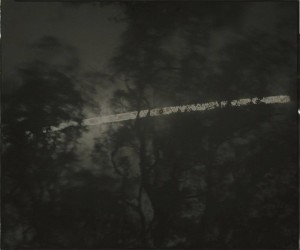
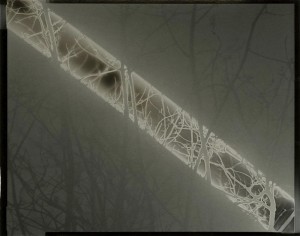
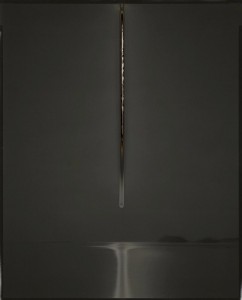
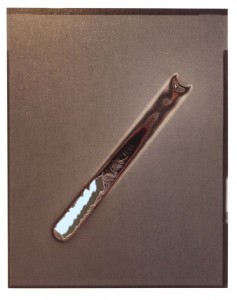
I nominate you for the best use of the most overused word in the panoply of adjectives. And the rest of this post was pretty enlightening too.
Pretty cool. I’d love to see them in person. Definitely more abstract and process-oriented than what usually catches my eye, but the images are really striking, like you said. The one from the Galapagos is a little spooky and much more interesting after I understood how it was made.
Thank you for showing these fantastic images! I’m going to find this at a bookstore so I can feel the die-cut image.
Congratulations for getting such a great present!
And Happy New Year.